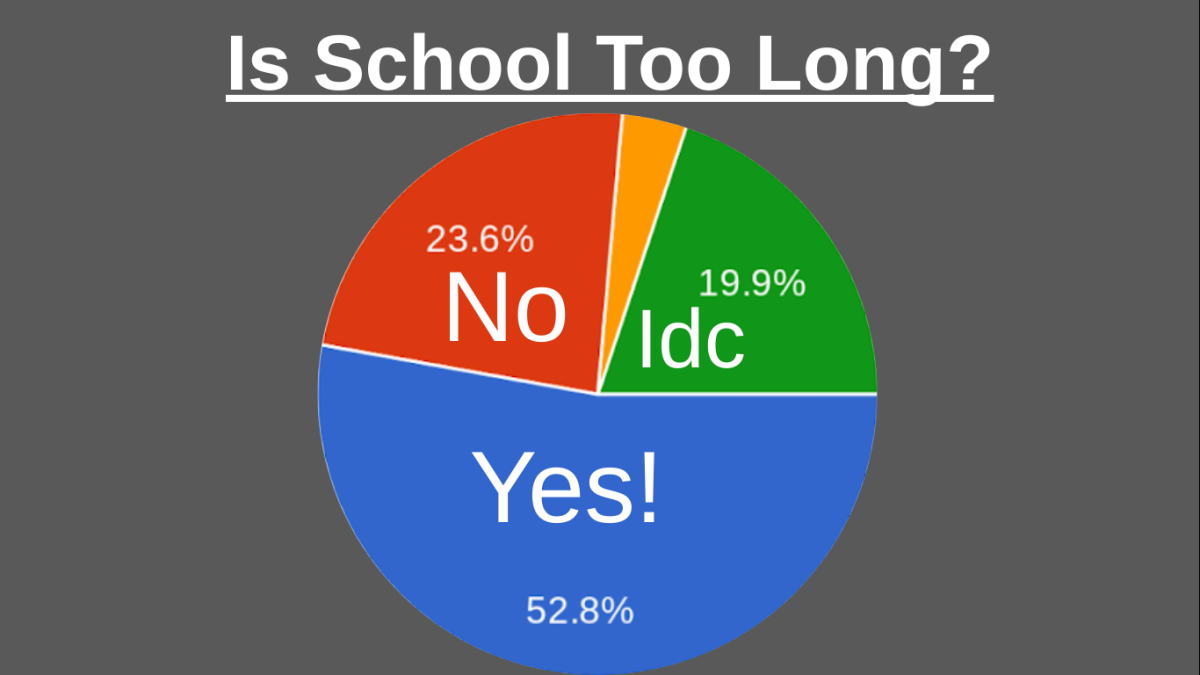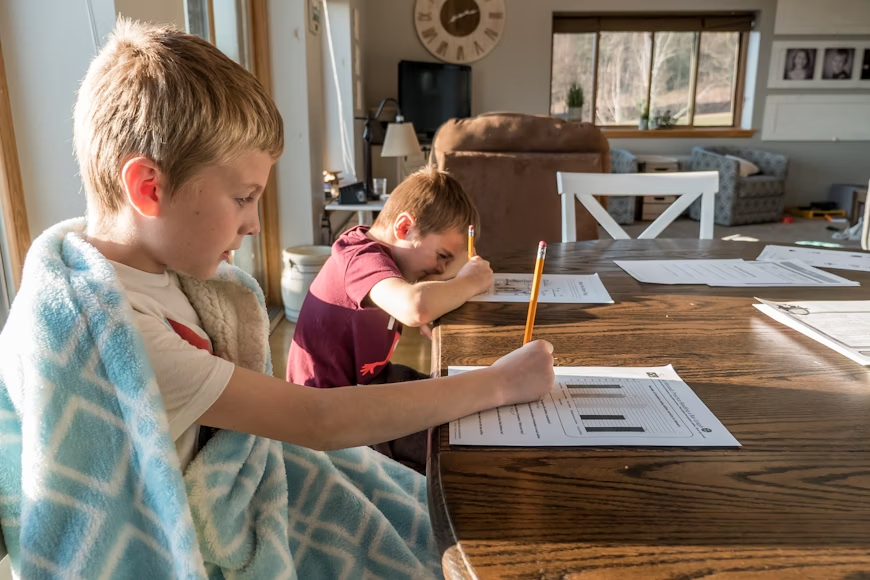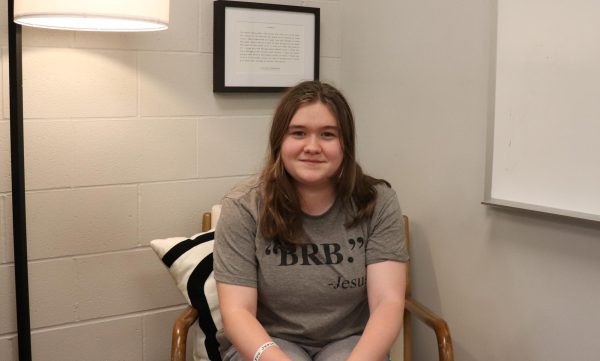Should school be shorter or start sooner? I decided to find out if the students of Dover High School agreed. I also decided to weigh the teachers’ opinions and consider the potential downsides of a shorter school day.
Representation
I sent out a survey to see what the students and teachers of Dover High think about the school day. Over one hundred students chose to fill it out, but less than ten teachers did, yet the teachers still gave valuable input. Below is the graph of the proportion of the participants in the survey and their corresponding grades:

The survey has a great amount of representation from each grade level.
Changes to the School Week
First, I asked what students think about the length of a school week. If a student or teacher could choose which days to go to school, what days would they pick? Here is the data for which days were most popularly picked:

Here is the data for the number of days a week school respondents suggested:

It seems a 4-day school week is the most popular suggestion, so which day should be removed?
“Either we drop Monday or Friday. I would prefer Monday though,” says Aiden Yakley, a sophomore. Gavin Pringle, a sophomore, agreed he would prefer not to have school on Monday. The data reflects that many agreed with Gavin and Aiden.
Realistically, would losing Monday benefit a school week? It is the day when most students are unprepared and exhausted because they forget about school over the weekend and try to get back into the schedule. On weeks that skip Monday due to a teacher in service, Tuesday feels like a Monday, which doesn’t fix anything. Friday would likely be more beneficial since taking it away makes the weekend, the most treasured break of the week, come sooner. Students tired of school would be relieved to reach the end of the week sooner. Emma Dessecker, a junior, believed a three-day weekend would benefit students and teachers alike, resulting from losing Monday or Friday.
“Well, students tend to get burned out by Friday due to constant 5 days of work, so I suggest having Monday-Wednesday, break Thursday, School Friday/Saturday, break Sunday,” suggested Emily Flood.
“I think we should split the week and have Wednesday off for everyone,” Hadley Sanders stated.
Not everyone wants a 3-day weekend. Others may prefer a break in between the week so school feels less overwhelming. Taking Wednesday off may be a better solution for people who do not like experiencing the school week all at once, and it gives students a more even schedule. It is less popular, but also a clever idea. Having a break in the middle may not make the school week feel shorter, but it is a recovery day. Emily’s solution is logical, even though many people may like having a two-day weekend more than a Wednesday off.
The Length of a School Day
How do students and teachers feel about the length of a school day, and how do they feel it could be improved? Here is how respondents felt about the school’s length:

To those who do not understand statistics, slightly over half of those who filled out the form felt school was too long while most of the other half either liked the school length or did not mind it. Although many methods were well-liked and pursued when it came to changing the schedule, so there was not an obvious agreed-upon answer.
Shorter Periods
The most popular decision of the respondents was to have shorter class periods. 73.3% out of all responses had ideas about changing school classes in length. Here is how long respondents believed one period should be:

The most popular decision was having 26-35-minute classes. If the classes changed to be 35 minutes long, the school day would change to five and a half hours rather than almost seven! This would excite students. However, this would not lead to happy teachers. If anything, longer periods would benefit most teachers by giving them more time to teach.
“I feel now teachers have to rush to make sure that we get all of the notes done in 45 minutes,” commented Taylor Brogan, a senior.
“I would not want less time in my classroom, but I would be able to utilize fewer days,” confirmed Mrs. Willoughby.
Fewer Periods
Another popular decision was having fewer periods. About 60.2% of all had ideas about losing periods.
Here is how many periods these respondents felt should be lost:

Why do we have periods in high school in the first place? Most rooms in the High School can fit no more than thirty students at a time, and the schedule allows students to switch up their environment during the school day while keeping the rooms from getting too full. Many teachers can also teach multiple classes because of the schedule. Fewer periods could affect how often students switch classes and how many different classes become available. This may upset some students who enjoy taking many electives and could also radically change the entire school schedule.
“Personally, I would love to take every art class and some other electives. However, that just will not be possible with how many I want to take and how many periods we have in a day,” mentioned Carleigh Carpenter. Having more elective periods is good for students like Carleigh, who enjoy utilizing elective classes.
“You should be required to come in and attend all four core classes then be done with the day. But for someone who would want to take an art class or any elective, there should be the availability to do that,” suggests Brayden Bergeron. His suggestion is fair; if you want to stay at school longer, you are welcome to, but you do not have to. Instead of changing school periods, why not make some of them optional? It would not change the schedule much and would allow students to take as many classes as they want, benefitting all students.
Should School Start Later
Not only is the school day’s length something big to consider, but also what time school starts. Many kids complain about school starting too early, as they tend to stay up late at night and prefer sleeping in. Here is what some of them said:
“I think we should eliminate the first period. People would [be] more awake,” stated Lyela Miller, a junior.
“Please just make school start 30 minutes later,” requested Madilyn Angstadt, a freshman.
“I feel like the days start too early; you have to wake up early enough to be at school on time. Depending on the person and how far they live, they are not really able to perform their best in their earlier classes,” commented Molly Neuzil, a junior.
“I think school should start later because it is scientifically proven that students do not perform as well when they wake up too early,” said Gavin Mastroine, a freshman. Anna O’Donnell agreed and explained that a school day that starts later would be beneficial to students’ mental health and performance and benefit the teacher’s mental health as well. She used the source by Johnes, Simona 6 Reasons Why School Days Should Be Shorter.
“I think [starting later] would help everyone not be as tired in the morning!” remarked Kara Lint, a junior.
“I have realized that starting school for students at 7:45 who are busy with sports and other activities that run during the night is not good for their sleeping routine, which is why we need to start later,” confirmed Luke Shreiner, a senior.
Here is what all respondents believed about the time school starts:

If school were to start later, here is how much later respondents thought:

The main concern about starting school later is ending school later. Students would have less time to themselves or for work, and extracurricular activities such as sports would be interrupted. Some commented that losing that time would be worth it; moreover, losing it would lead to a greater call for a shorter school day.
Lunch Dilemma
There was another complaint from mostly juniors and seniors about the school day:
“Students are given the “privilege” of open lunch but rarely get to fully enjoy it because there is hardly enough time to run to Subway, which [for example] is more than 2 minutes away from the school,” remarked Zander Ady.
“I think school would be more enjoyable if lunch was longer, especially for the upperclassmen. Lunch is plain stressful when you only have 30 minutes,” mentioned Maddy Luellen.
“I believe we should lengthen the lunch periods and have one singular lunch period. When our schedule has multiple lunch periods, friends are split up during their only period for socialization. Also, the length of the period is, realistically, just too short to allow juniors and seniors to enjoy their freedoms of an open lunch,” Kacy Ireland said.
“The lunch period is not enough time. Going out to eat for juniors and seniors is pointless,” Luke Shreiner pointed out.
It is very clear that students who want an open lunch want more time to do so; however, those forced to stay in school for lunch may not all like the idea of an hour-long lunch. Many juniors and seniors can even stop at home for lunch if they so choose, but the underclassmen do not have that right. Some students may appeal to the idea of a longer social period, whereas others prefer a quick lunch for a shorter school day. Why spend time at lunch stuck at school when students can do more when they are free afterward? If the idea of making periods optional was used, students could choose a longer lunch.
More Creative Ideas
There were some other creative ideas to change the entire school day, week, and year:
“I also think it would be a good idea to have split days, where some kids can complete their classes in the morning before lunch and then go home, while others can come in after lunch to have class in the afternoon,” mentioned Hadley Sanders, a sophomore. This could potentially solve the too-early start issue and not interfere with extracurricular activities.
“I would like 1-1.5 hour long block classes. A schedule that is similar to a college schedule. You would have some classes on Tuesdays and Thursdays. The other classes would be on Mondays and Wednesdays. Fridays are study hall, tutoring, and studio days, where teachers host office hours. I believe the Fridays would provide support to students who do not have time outside of school to complete homework, study, etc. It could also provide an opportunity for staff collaboration,” suggested Mrs. Milleman, a teacher. Taylor Brogan and Luke Jones agreed on the college schedule idea. This idea would allow some teachers to have more than enough time to teach. At the same time, some students may not like the idea of spending a double period on a single subject.
“When I lived in Germany, we had 8 periods, but we would split them in half. We would do the first 4 on a day, which was considered an A day then we would do the last 4 the day after and it would be a B day. It made every day seem different, and I think it just made sense!” commented Emma Murray, a sophomore. Splitting the school day like this would definitely make school shorter and lead to a lot of happy students. A possible downside is that it would be like having only 2 days of school periods, and there would likely be hardly enough time for some classes to be taught in class.
“On Mondays, the school day starts 45 minutes after the regular time [and] on Fridays the school day should end 45 minutes early,” said Jaxson Anslow, a sophomore. The only potential downside to this idea is that there would be an imbalance in the schedule.
“Elementary school hours were the best for me and my family!” said Aden Lambert, a senior. It would be nicer for students to start later, which also means finishing later.
“All year schooling with only 3 days in the week and longer holiday breaks,” suggested Pheonix Davis, a junior. This could potentially make the school week way easier, even though it is not very likely all students and teachers are willing to pay the hefty price of losing their summer break. There would also be a much smaller transitional period between school years. It could make school feel like it is never going to end, but it could also be beneficial by making school far less stressful and shorter every week.
There were a lot of creative thoughts about how to change the schedule! A special thanks to all the students and teachers who took the time to share their thoughts.
Should school change?
To wrap this up, as good as some of these ideas sound, there are also many downsides not even mentioned in this article. Mr. Shankle could not have worded it much better:
“If the time is SHORTER, students would have to do MORE WORK OUTSIDE OF CLASS. If the time is LONGER, students could get more work done WHILE IN SCHOOL. If actual changes were to be made (and NOT just to discuss them), SO MANY EFFECTS would exist that may or may NOT be positive for everyone. How would after-school practices/activities be affected? How would parents handle picking up and dropping off their children at different times during the school day? How would teachers like to go home later/earlier? There already is not enough time in a school day to accomplish everything people need to do – hence, the need for homework – so, do you really want to have to spend more of your “free time” doing schoolwork?”
The only way a change would be accepted is if it benefits everyone involved with the school schedule. Finding a change that fits well for everyone is not easy. Even if someone miraculously came up with an idea that is beneficial to everyone, it probably would not be enforced. There are many satisfied with the school day right now because the school schedule works well for them. For now, it is best to stay with the schedule that Dover has. Why change something that already works well? Remember, while it could be much better, it could also be much worse.














